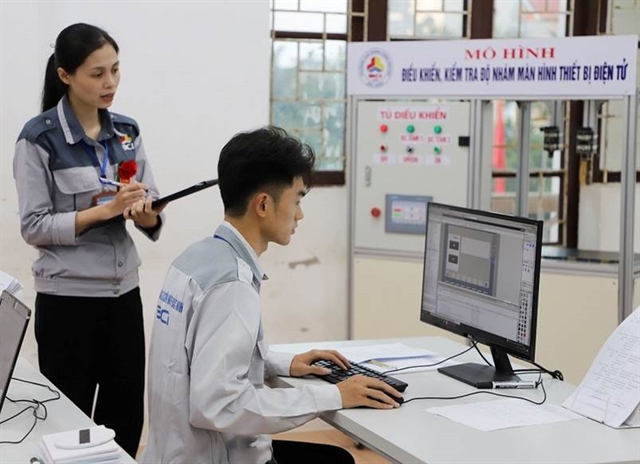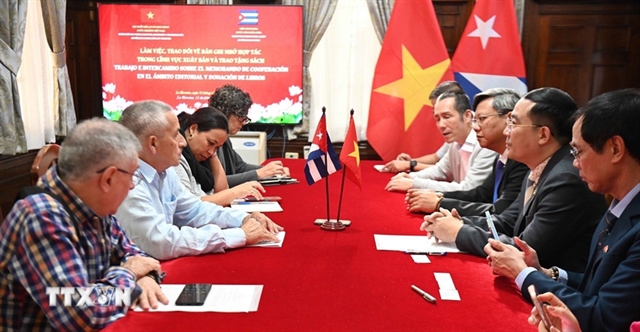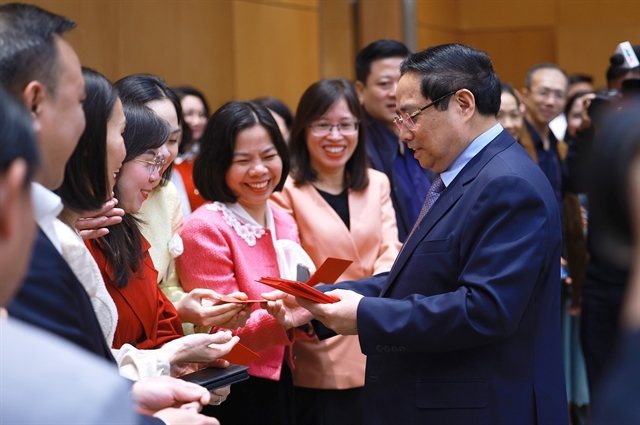 Society
Society

 |
| Statistics from the General Directorate of Vocational Training show that 42 out of the 63 cities and provinces have issued a plan for digital transformation in vocational education. — VNA/VNS Photo |
HÀ NỘI — With different levels of progress in digital transformation, vocational schools are calling for common standards for data synchronisation to improve training and management quality.
Digitalised lessons, teaching materials and integrated pedagogical methods have become more common in vocational schools, however, digital transformation remains a major challenge, especially for those in the more remote areas, said the principal of Đắk Nông Community College Dr Nguyễn Hữu Lành.
“Đắk Nông Community College was only established five years ago but it has a strategic direction of a key training facility for the region in alignment with digital transformation,” said Lành.
The school has also invested in and put into operation software for online learning, as well as automobile and inverter engine design and simulation, he added.
Lành said: “Our school puts special focus on digitising, developing, updating e-lessons and exploring learning resources, which are assigned to teachers.
“However, due to our geographic location and type of training, these activities are still spontaneous and not systematic, which means quality control is difficult.
“These shortcomings and bottlenecks, if not addressed, will hinder the school’s digital transformation process.”
Meanwhile, a representative of Bắc Ninh College of Industry said that the school has three different management software.
Student enrolment data input is being done manually, while this database could be connected to the data system of the Ministry of Education and Training (MoET).
The college has proposed the General Directorate of Vocational Training (under the Ministry of Labour, Invalids and Social Affairs - MoLISA) to issue a set of criteria and standards on digitalised vocational schools, which the educational institutions can base on to develop their own digital transformation roadmap.
It is also recommended that educator training should align with digital transformation, allowing hybrid training that combines online and face-to-face formats. Coordination between the General Directorate of Vocational Training and the MoET for student admission is also necessary.
A representative of An Giang Vocational College believed that a standard for data should be issued soon to connect the databases of vocational schools and the General Directorate of Vocational Training, instead of having to develop complex software for common use.
It will be difficult for vocational schools to use the same system due to their differences in training specialities, programme codes and evaluation methods, said the college’s representative.
According to Đặng Minh Sự, head of the vocational education division at HCM City Department of Labour, Invalids and Social Affairs, vocational schools are still fumbling with digital transformation due to inadequate technical infrastructure, in addition to the lack of digitised textbooks and lessons, a shared data system, as well as limited capacity of educators.
While multiple vocational school leaders have shown interest in revamping management and digital teaching, they struggle with implementation due to modest budget and infrastructure, he said.
Statistics from the General Directorate of Vocational Training show that 42 out of the 63 cities and provinces have issued a plan for digital transformation in vocational education.
The general directorate also received support in developing a set of criteria and standards to evaluate digital/smart colleges; and building a digital competency training module at intermediate and college levels to equip students with the necessary skills to respond to job requirements in the new context.
To develop digital transformation skills for educators, the MoLISA issued Circular No 06/2022/TT-BLĐTBXH which includes a teacher training programme on digital learning in vocational education.
Phạm Vũ Quốc Bình, deputy director-general of the General Directorate of Vocational Training, said: “The most important thing recently has been the change in the awareness of digital transformation among vocational education institutions and localities.
“Many of them have been more proactive in applying information technology in vocational training. However, digital transformation progress is not the same in every institution.”
In the future, the general directorate will continue perfecting policies and mechanisms for digital transformation in vocational education; issuing standards on digital schools, digital infrastructure and digital programmes, among others; and developing regulations on vocational education databases to ensure data synchronisation following the regulations of the Government and the Ministry of Information and Communications. — VNS




